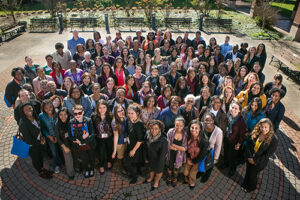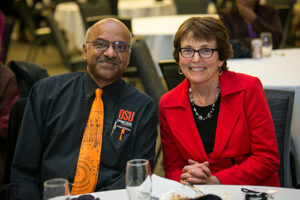Infinite Possibilities Conference Held at Oregon State University
Sastry Pantula and Srila Nayak
The biennial 10th Infinite Possibilities Conference (IPC)—which focused on empowering, educating, celebrating, and promoting the careers of under-represented minority women in mathematical and statistical sciences—was held at Oregon State University (OSU) March 1–3.

Photos by Bob Williams
The biennial 10th Infinite Possibilities Conference—held at Oregon State University in March—focused on empowering, educating, celebrating, and promoting the careers of under-represented minority women in mathematical and statistical sciences.
IPC is a program of Building Diversity in Science, a nonprofit organization that encourages diverse students to enter STEM disciplines.
Sastry G. Pantula, dean of the college of science, lobbied to bring the IPC to Oregon State this year and shares IPC’s commitment to greater inclusivity, innovation, and diversity in the mathematical and statistical sciences.
“We are committed to enhancing excellence through diversity in science and mathematics at OSU. I am thrilled to welcome the IPC to campus, which has done so much in the last decade to mentor, empower, and increase participation of minority women in the mathematical and statistical sciences,” said Pantula.
The conference attracted more than 230 participants from 19 states, Mexico, and Puerto Rico. More than 80 undergraduates, graduate students, and postdocs participated in a mix of sessions, including professional development workshops, panels on race/gender in the context of quantitative sciences, and a short course in biostatistics. Download a PDF of the conference program.

Sastry G. Pantula, left, dean of the Oregon State University college of science, with Christine Vernier, co-founder of Vernier Software & Technologies.
Throughout the three days, students networked and conversed with and learned from a cohort of high-achieving role models in statistics and mathematics. These included University of California at Berkeley–educated biostatistician Tanya Moore, founder of IPC and an education policy adviser; Talithia Williams, statistician and the first African-American woman to earn tenure at Harvey Mudd College; and Deborah Jackson, NSF program director and fellow of the National Society of Black Physicists.
The discussions encouraged young women to reflect on, learn from, and overcome challenges as they pursued careers in mathematical and statistical sciences. Speakers paid tribute to mentors and advocates who pushed and encouraged them to succeed.
In her keynote address, Erika Camacho shared a story of how she, a young girl from Mexico whose family struggled to make ends meet, ended up with a PhD in applied mathematics from Cornell University. Currently an assistant professor at Arizona State University, Camacho had a message for the crowd: “Becoming a successful quantitative scientist requires two things: the individual and the community.”
Williams shared her own academic and personal journey, learning a powerful life lesson of how failure leads to success. She also explained her statistical disease modeling research that has proven successful in predicting the cataract incidence rate in developing countries in Africa.
Attendees at all stages of their careers participated in numerous roundtables and breakout sessions focused on topics such as applying to graduate school, pathways outside academia, building a sustainable research program, and work-family life equilibrium.
Statistical presentations featured the diverse uses of statistical software, tools for predicting patterns in genetic data, and analyses of Alzheimer’s disease studies. A panel on the Big Data boom highlighted the need for a combination of foundational statistics courses and data mining; training in software programing tools such as SAS, R, and Python; and communication skills to succeed in the current data-driven job market.
The conference concluded with an awards ceremony. The Etta Z. Falconer Award for Mentoring & Commitment to Diversity was presented to Genevieve Knight, a retired educator from Coppin State University and a pioneering advocate for equity and inclusion of women and minorities in the mathematical sciences.

















